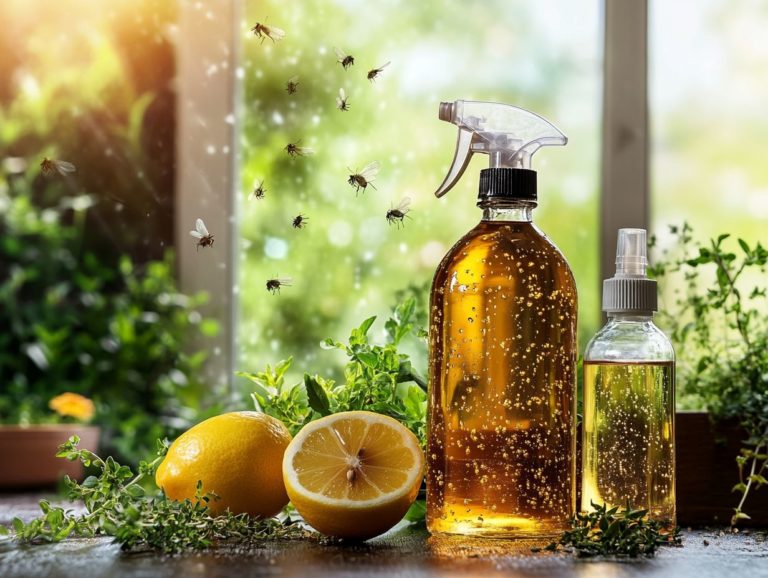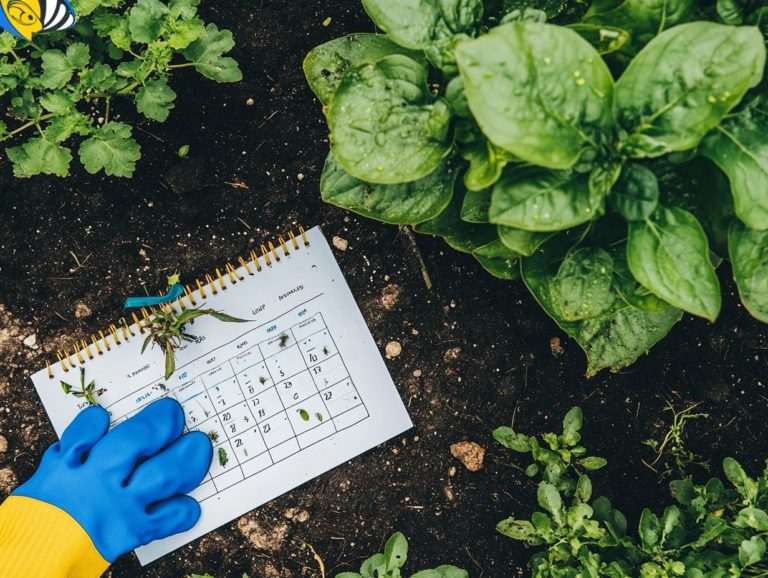Using Neem Oil for Pest Management
Neem oil stands out as a true powerhouse in the realm of natural pest management. It is renowned for its efficacy and eco-friendly attributes.
This remarkable oil, extracted from the seeds of the neem tree, tackles a diverse range of pests. It also brings along a host of additional benefits.
In this article, you’ll delve into how neem oil functions as a natural pesticide. You’ll receive expert guidance on its application methods and dilution ratios and learn important safety precautions to keep in mind.
Its impressive array of uses makes it an essential addition to your gardening toolkit.
Discover how neem oil can revolutionize your pest control strategy while ensuring the safety of your garden and the environment!
Contents
- Key Takeaways:
- Benefits of Neem Oil for Pest Management
- How to Use Neem Oil for Pest Management
- Precautions and Safety Measures
- Other Uses for Neem Oil and Agricultural Uses
- Frequently Asked Questions
- What is neem oil and how does it work for pest management as a biodegradable product?
- How do I apply neem oil for pest management?
- Is neem oil safe to use for pest management?
- What pests can be controlled with neem oil?
- Can neem oil be used on all types of plants?
- What are the benefits of using neem oil for pest management?
Key Takeaways:

- Neem oil is an effective, natural solution for pest control.
- It can be applied in various ways and diluted to specific ratios based on the type of pest.
- While generally safe, precautions should be taken when handling neem oil.
Unlock the Power of Neem Oil!
Neem oil, extracted from the seeds of the neem tree, is a powerful organic pesticide in horticulture. This eco-friendly solution contains a natural compound that affects insects, which disrupts insect feeding patterns and stunts the growth of common houseplant pests like whiteflies, aphids, and spider mites.
As a biodegradable product, neem oil embodies the principles of sustainable living and environmental stewardship. It is a go-to choice for gardening enthusiasts and is suitable for both commercial and home use.
The ancient neem tree, native to the Indian subcontinent, undergoes a meticulous cold-press extraction process that preserves its beneficial properties. In pest management, neem oil is essential for repelling harmful insects while promoting plant health.
The beauty of neem oil lies in its selective action. It spares beneficial insects, maintaining the delicate balance of your garden ecosystem.
As an insect growth regulator, neem oil stunts the development of pests at various life stages. It comes in various formulations, including ready-to-use sprays, concentrates, and emulsifiable solutions, catering to your unique gardening needs.
Benefits of Neem Oil for Pest Management
The advantages of neem oil in pest management are extensive. It establishes itself as an essential ally in sustainable gardening.
This natural pesticide offers effective control of pests while preserving the well-being of beneficial insects. These insects play a vital role in maintaining a balanced ecosystem.
Its capacity to disrupt the insect lifecycle and address pest issues without harming mammals, birds, or fish highlights its significance in organic gardening.
Expert recommendations, such as those from Kim Toscano, underscore neem oil s versatility. It is a favored choice for both vegetable crops and ornamental plants.
Effective Pest Control
Effective pest control with neem oil harnesses its unique properties to disrupt insect feeding and reproduction. This leads to a significant reduction in pest populations, particularly for common houseplant nuisances like whiteflies and aphids.
The precision of neem oil targets specific pests without harming the beneficial insects that contribute to your garden’s ecological balance.
The natural compounds in neem oil, especially a natural compound that affects insects, repel pests and inhibit their growth. This makes it a powerful ally against harmful insects, including spider mites and mealybugs.
You can choose various application methods, such as foliar sprays or soil drenches. These ensure that the active ingredients penetrate exactly where they re needed most.
By incorporating neem oil into your gardening routine, you create a healthier environment that encourages beneficial predators like ladybugs. They naturally help control pest populations.
This integrated approach reduces your reliance on traditional pesticides and enhances the sustainability of your garden ecosystem.
Organic and Environmentally Friendly Option
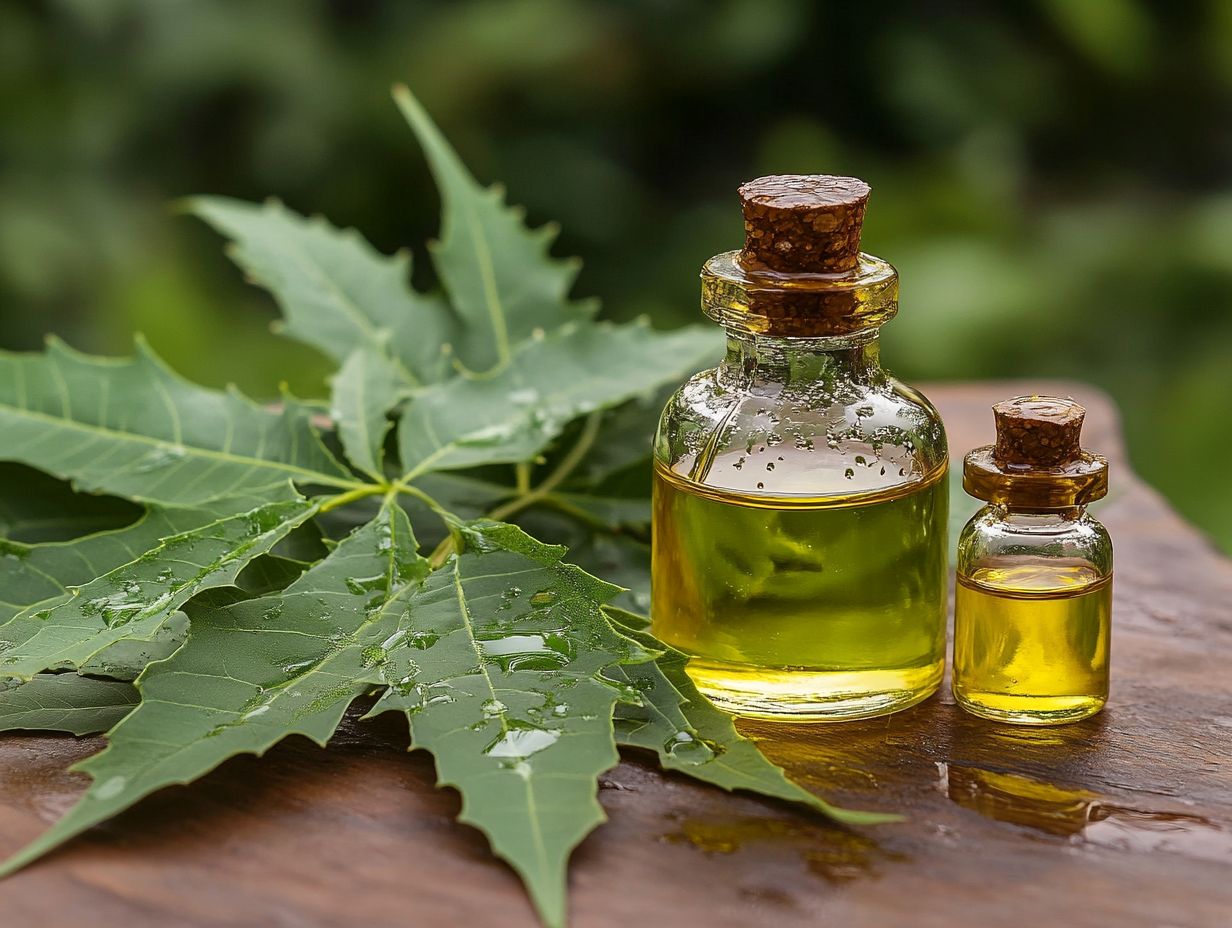
Neem oil is an exciting and effective solution for pest control, is a great example of organic and environmentally friendly practices. This biodegradable product minimizes harmful effects on the environment while effectively tackling pest issues. For gardeners who cherish eco-friendly methods, neem oil offers a pathway to nurture both their plants and the surrounding ecosystems.
By incorporating neem oil into your holistic pest management strategy, you can protect the health of your garden. This natural remedy not only deters infestations without leaving behind toxic residues but also enriches the soil, encouraging the growth of beneficial microorganisms. Its application can enhance plant immunity, resulting in stronger, more resilient flora.
Ultimately, embracing neem oil resonates with the values of discerning gardeners, supporting biodiversity and fostering a sustainable connection with nature.
How to Use Neem Oil for Pest Management
Using neem oil for pest management offers a range of application methods specifically designed to cater to the unique needs of your plants and the pest challenges you face. You can opt for diluted solutions, spray applications, or even soil drenches, allowing neem oil to shine in various gardening situations.
Whether you prefer concentrated formulas or ready-to-use products, grasping the right approach will not only boost your plants health but also maximize your success in pest control.
Application Methods
Effective methods for applying neem oil include spray applications and soil drenches, allowing you to achieve targeted pest control for both your indoor houseplants and outdoor gardens. To get the best results, it’s crucial to assess the specific pest problem and the types of plants you re treating.
Applying neem oil as a foliar spray directly addresses insects feeding on your plant tissues, while soil drenches provide systemic protection, which means it protects your plants from pests hiding in the soil.
Before applying neem oil, remember that dilution is key; mixing it with water and a small amount of mild soap enhances its adherence to leaves. Use a pump or hand sprayer for even application across your plants.
Timing is of the essence applying neem oil in the early morning or late evening helps prevent evaporation and maximizes absorption. The frequency of application can depend on how prevalent the pests are, but weekly treatments generally prove effective.
Always check the weather conditions; applying neem oil during dry spells minimizes rapid runoff, allowing the treatment to penetrate deeply into the plant system.
Recommended Dilution Ratios
Recommended dilution ratios for neem oil depend on its formulation and the specific pest you’re targeting, allowing for effective application without putting your plants at risk. Generally, for home use, you ll want to mix neem oil with water at a ratio of 1-2 tablespoons of the concentrated formula per gallon of water. If you’re using ready-to-use products, it’s crucial to follow the label instructions to achieve optimal results.
Different situations may require tailored adjustments; for instance, if you’re dealing with aphids on leafy greens, a stronger mixture of 2 tablespoons per gallon can be beneficial, while a lighter solution may work just fine for scale insects on more delicate flowers.
Make sure to mix the solution thoroughly to ensure an even distribution before applying it. When treating any pest, spraying early in the morning or late in the evening helps minimize the risk of leaf burn and promotes better absorption.
Remember, varying formulations might call for different approaches; for tougher plants, start with a lower ratio to assess their response before moving to a more potent mix.
Precautions and Safety Measures
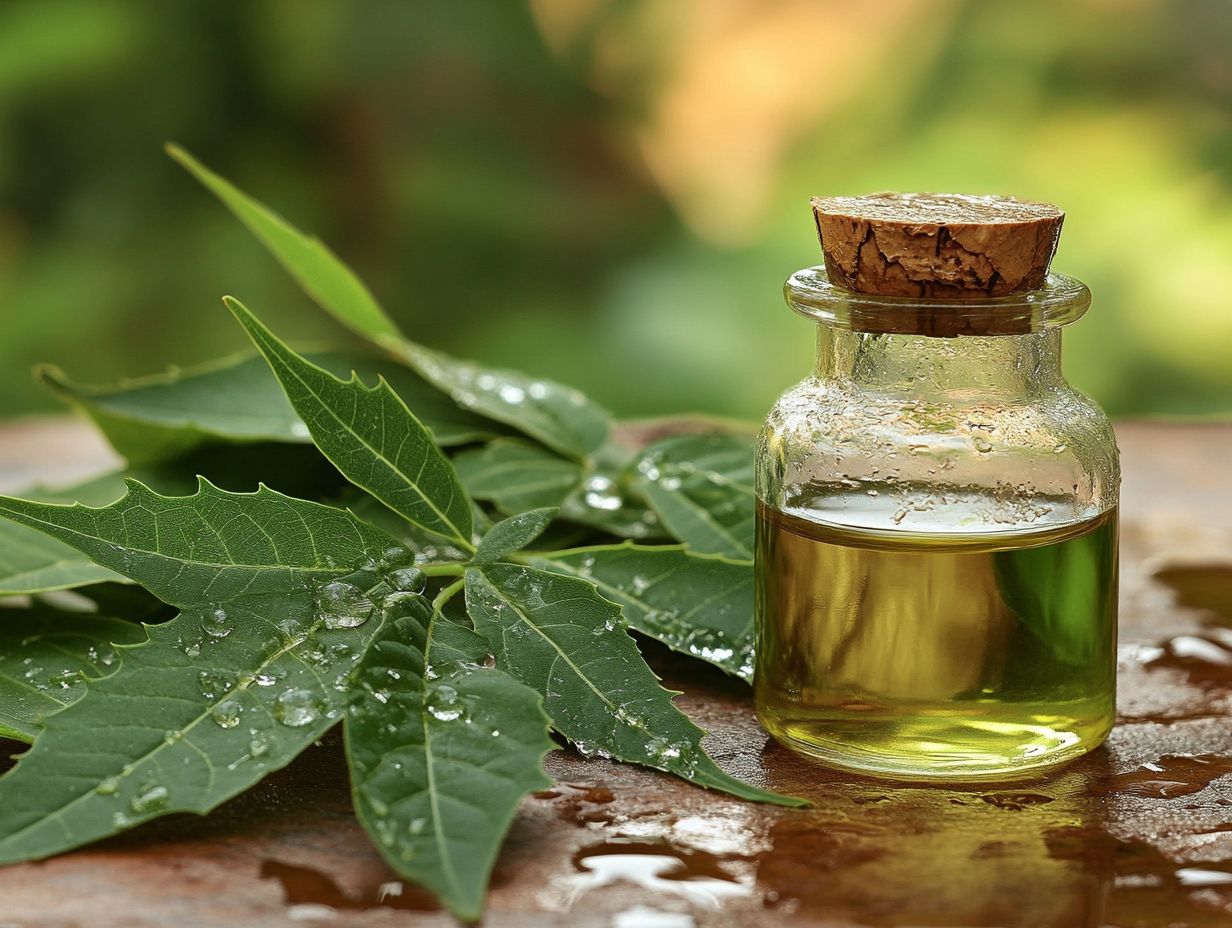
When utilizing neem oil for pest management, it’s essential to follow precautions and safety measures to safeguard both your health and the well-being of your plants. Although neem oil is generally regarded as safe, improper application may pose risks, including plant damage in sensitive plant varieties and adverse reactions in certain beneficial insects.
Understanding the proper treatment methods is vital to achieving optimal results.
Potential Risks and How to Avoid Them
While neem oil is generally considered safe, you should be aware of the potential risks it poses to ensure you avoid any harmful effects. Misapplication can lead to issues like plant damage, particularly in young or sensitive plants, and it can also unintentionally affect beneficial insects. To mitigate these risks, it’s crucial to adhere to best practices and monitor your plants after application.
In some cases, the concentration of neem oil might exceed what a plant can handle, especially in high temperatures or bright sunlight, which can result in leaf burn. Spraying during the active hours of pollinators can harm these invaluable insects, who play an essential role in maintaining a balanced ecosystem. To minimize such negative outcomes, apply neem oil in the evening or early morning when beneficial insects are less active.
It’s also wise to start with a patch test on a small area of the plant and observe its response over the next few days. Adjust your application frequency and dilution rates based on these observations, ensuring a thoughtful approach to pest management that protects both plant health and local wildlife.
Other Uses for Neem Oil and Agricultural Uses
Beyond its pivotal role in pest management, neem oil presents a host of additional benefits and applications in horticulture and agriculture.
Renowned for its insect-repellent properties, neem oil effectively shields both ornamental plants and vegetable crops from a variety of pests while enhancing overall plant health and resilience.
Its versatility goes beyond mere pest control, making it a valuable ally in sustainable gardening practices.
Additional Benefits and Applications
Discover the amazing benefits of neem oil for your garden! Neem oil serves as a substance that controls insect growth and effectively manages a wide range of pest issues. By disrupting insect lifecycles, you contribute to sustainable living practices while nurturing vibrant ecosystems within your garden. Its use not only enhances plant health but also promotes a holistic approach to pest management.
Neem oil also helps prevent diseases by stifling the growth of harmful fungi and bacteria, ensuring your plants remain vigorous and productive. Its systemic action means that once absorbed, it bolsters your plant’s natural defenses, delivering long-lasting protection against pests and diseases.
This powerful ally improves soil quality by fostering beneficial microbial activity while supporting environmental stewardship by reducing your reliance on chemical pesticides. By incorporating neem oil into your gardening routine, you can cultivate lush, thriving gardens that are safe for both the environment and future generations.
Frequently Asked Questions
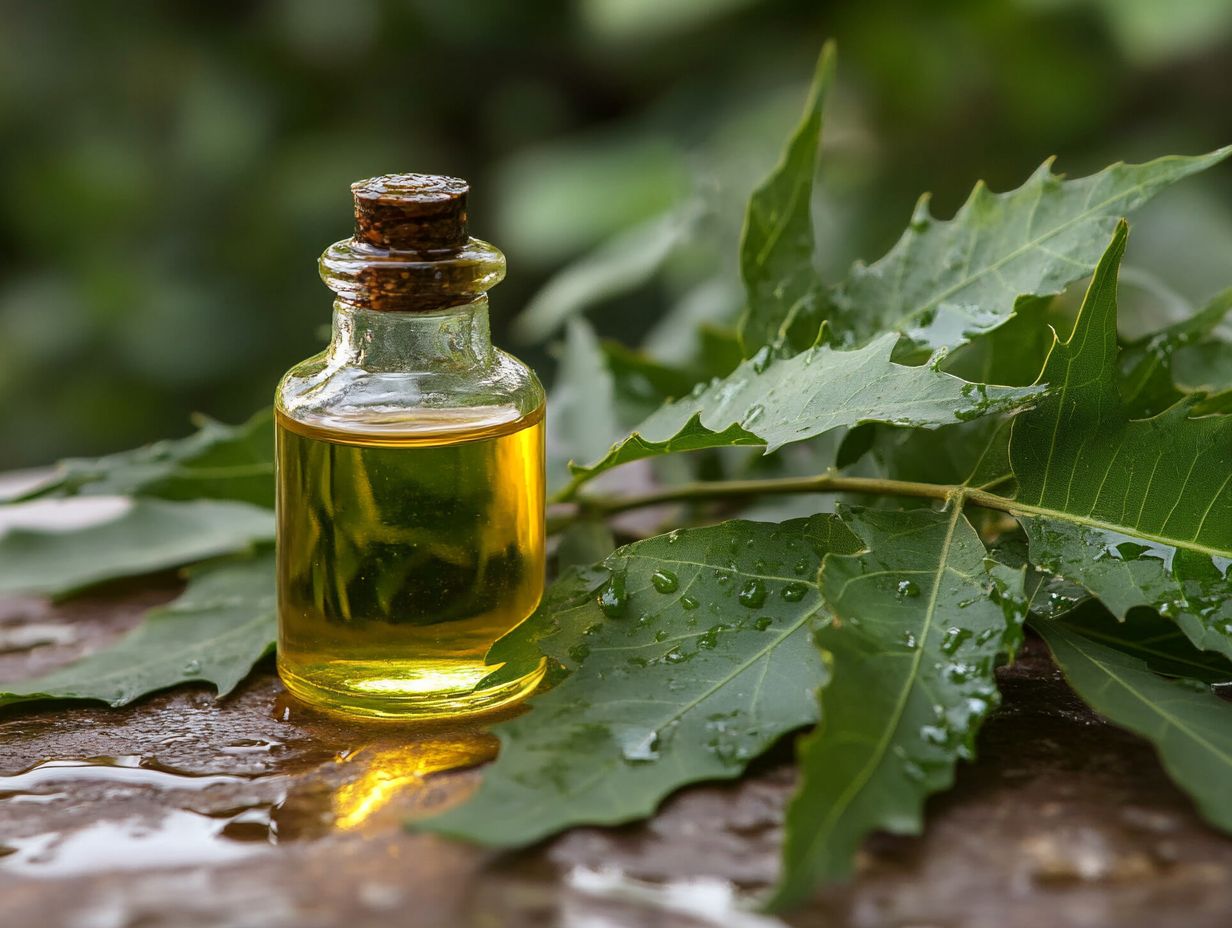
Got questions about neem oil? Here are the top FAQs answered!
What is neem oil and how does it work for pest management as a biodegradable product?
Neem oil is a natural and organic oil extracted from the neem tree, known for its insecticidal and medicinal properties. It works by disrupting the life cycle of pests and inhibiting their feeding and reproduction.
How do I apply neem oil for pest management?
Neem oil can be applied in various ways, including spraying, drenching, and using it as a soil drench. It’s important to follow the instructions on the product label and to apply it during the recommended time of day, usually early morning or evening.
Start using neem oil today to see the difference in your garden!
In conclusion, neem oil is a powerful tool in managing pests while also supporting plant health and the environment. With the right application and precautions, you can enjoy a thriving garden.
Is neem oil safe to use for pest management?
Yes, neem oil is a natural and safe option for pest management. Always follow product label instructions and avoid using it on sensitive plants.
What pests can be controlled with neem oil?
Neem oil works well against soft-bodied insects like aphids, mealybugs, scale insects, and whiteflies. It can also combat mites and some caterpillars, but isn t as effective against hard-bodied insects like beetles.
Can neem oil be used on all types of plants?
Neem oil is suitable for many plants, including fruits, vegetables, ornamentals, and herbs. Always test on a small area first to check for any negative reactions.
What are the benefits of using neem oil for pest management?
Neem oil is a natural, non-toxic alternative to chemical pesticides. It effectively controls various pests and helps maintain overall plant health!





